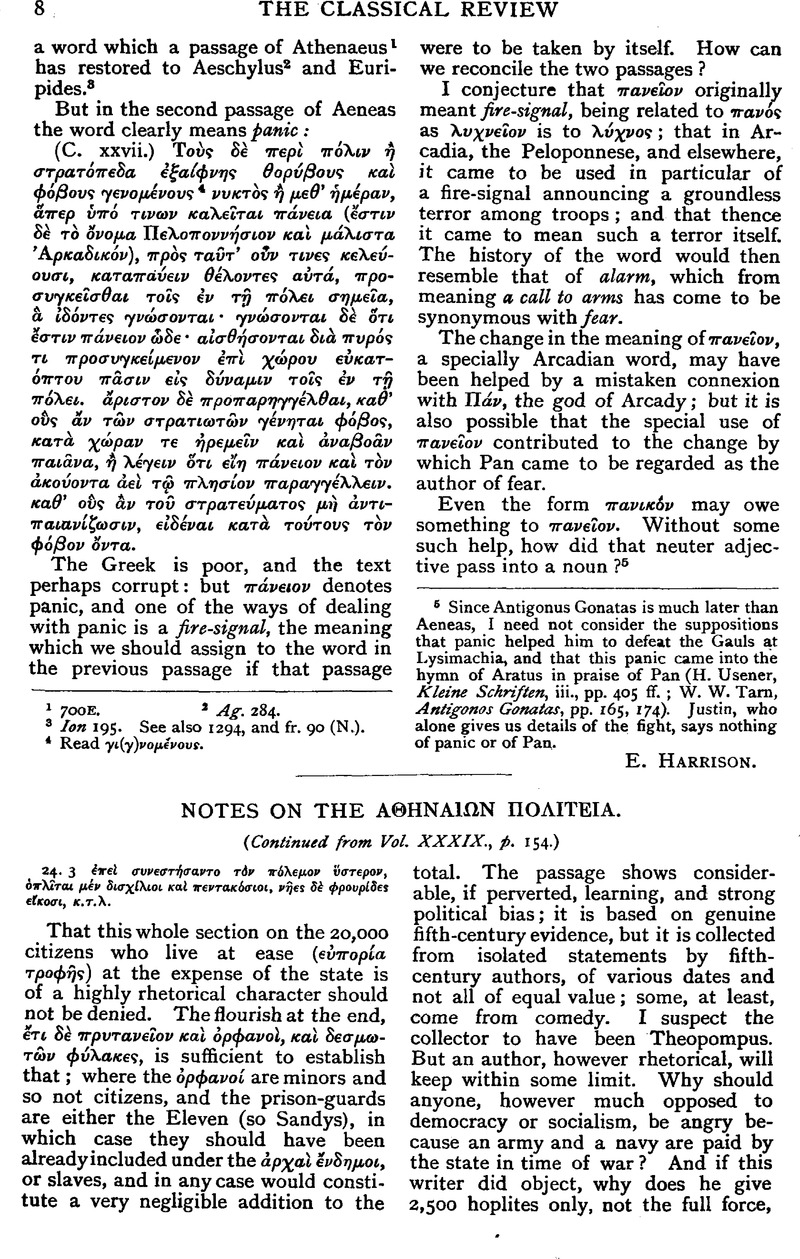Article contents
Notes on the ΑΘΗΝΑΙΩΝ ΠΟΛΙΤΕΙΑ
Published online by Cambridge University Press: 27 October 2009
Abstract

- Type
- Review Articles
- Information
- Copyright
- Copyright © The Classical Association 1926
References
page 9 note 1 Sandys adds these 2,500 to the 6,000 dicasts and 500 bouleutae, and finds the result to equal exactly the number of Athenians (according to Pausanias) who fought at Marathon ; and adds the 700 home officials to that and gets a total only 300 less than the 10,000 Athenians who marched into the Megarid. Why not say also that the 6,000 dicasts are not far short of the number of hoplites who fought at Delion, and the 2,500 nearly equal to the number who fought at Chaeroneia ? Were no dicasts over age, and none of them thetes ?
page 9 note 2 He later (Stil u. Text, p. 181) reverted to the MS. reading.
page 9 note 3 One must say ‘ about,’ as the figure for the ![]() is corrupt; they may well have amounted to more than 700, as there were garrisons in some of the cities.
is corrupt; they may well have amounted to more than 700, as there were garrisons in some of the cities.
It is necessary, I think, to assume the full number of 4,000 for the twenty guard-ships, as have Kenyon. Without it we have no definite figure for this as for all the other items before the last three thrown in ; and 4,000 brings the total near the desired 20,000. All we have to suppose is that there was some evidence that at some time in the fifth century twenty ships were kept in commission for some eight months in the year manned entirely by citizens ; just as Plutarch (Per. 11), and he alone, had evidence that 60 ships were kept in commission largely manned by citizens. It is not necessary for us to believe either statement if we think probability is against them. Both may, however, be true for different times during Pericles' rule, or soon after.
It is curious that no special mention is made here of the Paralos and the Salaminia.
page 10 note 1 Schol. Ar. Lys. 421 and 609 follow Philochorus in this, indicating that his was the accepted version. But it may be noted that Harpocration, our authority for Androtion and Philochorus, misquotes Thucydides : ![]() and has misled Sandys here.
and has misled Sandys here.
Cary (pp. 10–11) also finds a difficulty in Thucydides' account of the meeting of the ecclesia at Colonus : What were the prytaneis doing to allow Peisander's resolutions ? and how did the oligarchs obtain the necessary προβ⋯νλε⋯ματα from the democratic Boulē ? But the only προβο⋯λευμα that was necessary was that a motion that any proposal could be made without fear of a ![]() should be allowed. After that was put and carried in legal form Peisander could propose what he liked. Thucydides' narrative is at any rate consistent, for in the previous chapter he has described the state of terror to which the democrats had been reduced by the oligarchical clubs. Ar. 29. 4–5 in general agrees with Thuc. 67. 2–3, except that the latter includes the appointment of the 400 among the resolutions passed, and Aristotle does not. As Aristotle does not tell us how the 400 were in fact constituted (if with Cary we reject c. 31), he is presumably wrong here and Thucydides is right.
should be allowed. After that was put and carried in legal form Peisander could propose what he liked. Thucydides' narrative is at any rate consistent, for in the previous chapter he has described the state of terror to which the democrats had been reduced by the oligarchical clubs. Ar. 29. 4–5 in general agrees with Thuc. 67. 2–3, except that the latter includes the appointment of the 400 among the resolutions passed, and Aristotle does not. As Aristotle does not tell us how the 400 were in fact constituted (if with Cary we reject c. 31), he is presumably wrong here and Thucydides is right.
That the proposed constitutions of cc. 30 and 31 were amongst those discussed after the 400 were overthrown during the brief rule of the 5,000 (cf. Thuc. VIII. 97. 2), as Cary, following a suggestion of Beloch's, proposes, seems to me a very probable solution of this difficulty. See, however, Ehrenberg, Hermes 57, 1922, p. 621 ff.
page 11 note 1 So 25. 4 ![]() , where it is quite unnecessary insert ⋯ before Θ., as all editors do.
, where it is quite unnecessary insert ⋯ before Θ., as all editors do.
page 11 note 2 Mommsen agrees with Blass, and suggests that the order of the festivals in Aristotle is their order within an Olympiad, the Herakleia being probably held in the third, and the Eleusinia in the fourth year (p. 162. 2).
page 12 note 1 Best of all would be εἰσ⋯ δ⋯ δ αἱ π. αὖται (combining suggestions of Kaibel and Harrison), but this involves too great a departure from the MSS.
- 1
- Cited by


